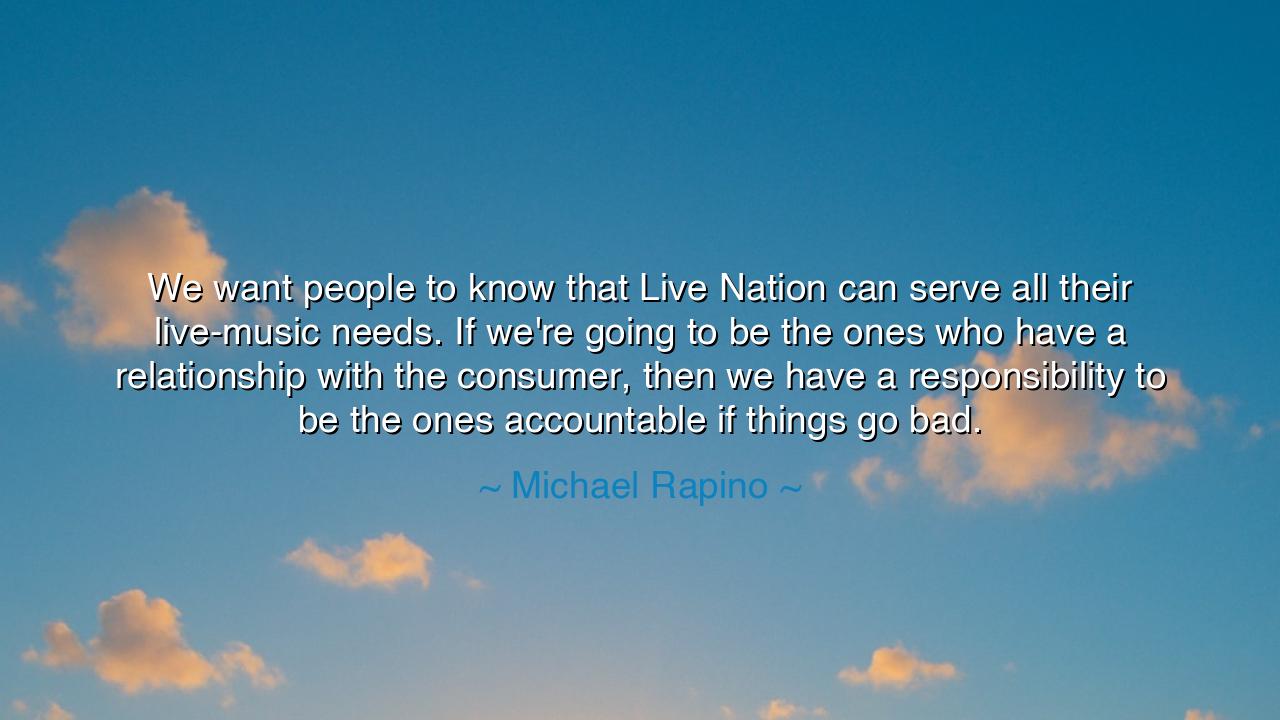
We want people to know that Live Nation can serve all their
We want people to know that Live Nation can serve all their live-music needs. If we're going to be the ones who have a relationship with the consumer, then we have a responsibility to be the ones accountable if things go bad.






Hear the voice of Michael Rapino, steward of great gatherings, who declared: “We want people to know that Live Nation can serve all their live-music needs. If we’re going to be the ones who have a relationship with the consumer, then we have a responsibility to be the ones accountable if things go bad.” In this he speaks not only of commerce, but of honor, trust, and the sacred bond between giver and receiver.
He proclaims that to meet the needs of the people is more than a transaction—it is a covenant. To hold the relationship with the consumer is to hold their confidence, their hopes, and their joy. The one who gathers the crowd must also safeguard their experience, for music is not mere entertainment, but a moment where souls unite, where hearts are lifted, and where memory is forged.
Rapino declares further that with responsibility comes accountability. To stand at the center of the exchange, to claim the trust of many, is to accept the burden of their disappointment should failure arise. It is easy to bask in praise when things go well; harder still to bear blame when they go ill. Yet true leadership demands both—the wreath of success and the weight of fault alike.
Thus, let this be remembered: in every bond—whether of art, of trade, or of love—the one who claims the relationship must also claim the duty. To lead is not to seek glory alone, but to answer for both triumph and mistake. In this way, Rapino’s words echo the ancient wisdom: that the measure of greatness is not in what one gains, but in how faithfully one bears the trust of others.






KCKiet Chan
Rapino’s statement highlights an essential point about consumer trust: if you’re going to claim the relationship, you must take on the responsibility, especially when things go wrong. It’s a strong statement, but I wonder, in a world where customer expectations are higher than ever, can Live Nation consistently meet those demands? What happens when unforeseen issues arise—how do they manage customer satisfaction without over-promising or overextending themselves?
DKPham Dang Khoa
I admire Rapino’s acknowledgment of Live Nation’s responsibility to its consumers. It shows that they take ownership of the customer experience, both good and bad. But I also question whether it’s possible to maintain this level of accountability in a business where external factors like weather, performer issues, or security can easily derail an event. How much can a company truly do to control the variables that affect a live event, and where do they draw the line on accountability?
CHCo Hac
Rapino’s commitment to accountability resonates with me, particularly in an industry where the consumer experience can be unpredictable. When a brand positions itself as the central point of contact for its customers, it must own the entire journey. However, I wonder, how much responsibility can be reasonably placed on one company in a highly fragmented industry like live music? Can Live Nation control every variable, or does it risk overextending itself?
Ttranthienbaongoc
Michael Rapino’s quote emphasizes accountability, which is crucial in any business. If Live Nation wants to be the go-to company for live music, they must take responsibility for both the highs and lows of the customer experience. But does this level of responsibility ever become too overwhelming, especially in a business as large as Live Nation? How does the company ensure that it can handle all aspects of the customer experience, especially when things go wrong?